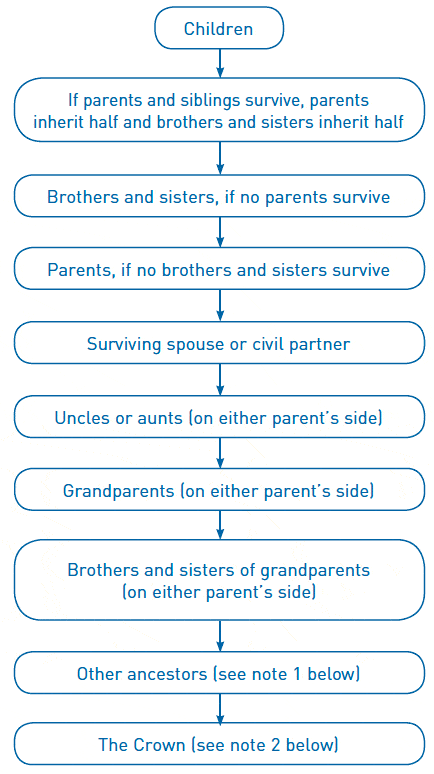Dying without a Will – What will happen to all my Assets?
When a person dies without a Will, his/her estate (all financial assets) is known as an “intestate estate”. With no instructions for the distribution of any of the money, property or possessions that would make up the deceased’s estate, these assets would fall to be distributed in accordance with the Rules of Intestacy.

If someone dies without a Will – Who inherits?
Normally, when someone dies with a will, an executor has usually already been appointed. The executor is responsible for administering the estate, gathering all the assets, paying all debts and then distributing the residue of estate funds to the nominated beneficiaries included in the Will. However, if a will hasn’t been made, and no executor has been appointed, the solicitor will need to submit an application to Court in order for an executor to be appointed, known as an “executor dative”. This is normally the surviving spouse or civil partner. If there is no such person, then another person entitled to inherit from the estate may also be able to apply.
A further legal procedure may also be required in an intestate estate and this is referred to as a Bond of Caution. This is a type of insurance the purpose of which is to ensure all estate funds are paid to the correct beneficiaries.

Stages in the Rules of Intestacy
1. PAYING OFF ANY OUTSTANDING DEBTS
Debts are paid out of the deceased’s estate. These debts usually include mortgages, loans and overdrafts. In addition, the executor will also have to check gas, electricity and telephone accounts & any similar accounts where regular payments are made and invite creditors to make claims. In some circumstances, there may also be unpaid Income Tax or Inheritance Tax, which should be settled before any assets can be distributed.
2. DEFINING THE ASSETS
Once debts are paid out, different types of assets held within an estate should be handled differently:
- Heritable Estate – involves any land or property that the deceased has owned
- Movable Estate – involves all other assets, such as the person’s belongings, physical and intangible assets, bank accounts, insurance policies, investments, collectibles and furnishings
3. DISTRIBUTING THE ESTATE TO BENEFICIARIES
When all estate assets have been clarified and all debts paid, the remaining residue of funds can be divided to the beneficiaries. Under intestacy only certain beneficiaries have the right to claim from the estate. The Rules of Intestacy outline who the hierarchy of beneficiaries will be. Commonly, a surviving spouse will be entitled to “prior rights” and “legal” rights with remaining children then being able to also claim legal rights and any remaining funds. In cases where there is no surviving spouse or children then extended family members may be able to inherit.
PRIOR RIGHTS
The first call on the estate is the surviving spouse or civil partner’s prior rights which comprise of:
- The right to the home in which she/he is living up to a value of £473,000
- Furniture to a value of £29,000
- The sum of either £50,000 or £89,000, depending on whether the deceased left children
LEGAL RIGHTS
The surviving spouse or civil partner and children are entitled to certain legal rights from the movable estate of the person who died.
The surviving spouse or civil partner is entitled to:
- One-third of the movable estate if the person who died left children or descendants of children (such as grandchildren)
- One-half of the movable estate if the person who died left no children or descendants of children
The children of a deceased person are entitled to:
- One-third of the movable estate equally between them if the person who died left a spouse or civil partner
- One-half of the movable estate equally between them if the person who died did not leave a spouse or civil partner
4. THE REMAINDER OF THE ESTATE
Once the prior and legal rights have been satisfied, the remainder of the estate devolves in accordance with the rules of intestacy. The Scottish Government has created a hierarchy set out by the Succession (Scotland) Act which describes the groups of people who inherit from an estate in this way:

source: gov.scot
If a person is left alive within one group, then no other group further down the chart will inherit from the estate. Additionally, it may be any surviving children of a predeceased beneficiary can claim their parent’s share of the estate.
At Wallace Quinn, we recommend that everyone have a Will in place regardless of the size of their estate or circumstances within the family. Dying without a Will could lead to several complications for you and your family. This is because your estate will fall to be distributed in accordance with Rules of Intestacy which may not accord with your preferred instructions. In addition, your inheritance could be passed on to people that you might not want to have it. There is also a heavy cost element as an executor will need to be appointed, alongside the Bond of Caution insurance policy that ensures your estate is wound up following the Rules of Intestacy.
Making a Will in Scotland is an easy and affordable process. We ensure your estate is distributed efficiently, carefully and accurately. In addition, you benefit from unlimited free Will updating services, so that your Will reflects your current circumstances. We also provide secure, fire, and flood-proof document storage for wills, ensuring executors can reliably access your will. Contact us today.
